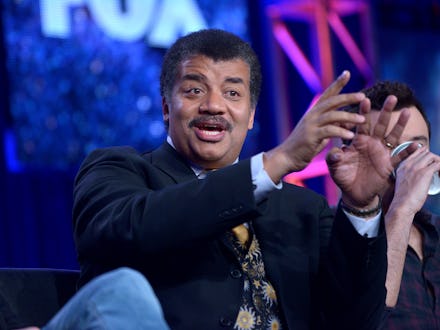Neil deGrasse Tyson Sum Up Exactly Why There Are So Few Black Scientists

Neil deGrasse Tyson, astrophysics' resident badass, is known not only for hosting the primetime science hit Cosmos, but also for always having the right answer when it comes to his field of study. As this video from a 2009 panel at the Center for Inquiry shows, Tyson knows what he's talking about when it comes to social issues as well.
Upworthy unearthed this 5-year-old video showing Tyson responding to an audience member who asks (rather in-eloquently we might add) "What's up with chicks in science?"
The question is basically, why are there so many more men working in science than women. As someone in the audience follows up, is it a question of genetics? Tyson answers the question going beyond the lens of gender and pushing his answer to include his area of familiarity: race barriers. Speaking about his aspirations to become an astrophysicist at a young age, teachers would ask the young Tyson if he wouldn't rather be an athlete. "I wanted to become something that was outside of the paradigms of expectation of the people in power," he said in response.
These social barriers expanded as Tyson got older, ingraining in him the idea that he was unwelcome in certain spaces.
"Before we start talking about genetic differences, you gotta come up with a system where there's equal opportunity," he said. "Then we can have that conversation."
As always, Tyson is right. The number of black scientists right now is strikingly low, even with pioneers like Tyson leading the way.
This disparity starts in the education system, where minority students are not being encouraged to study the sciences and where course study opportunity still breaks down across racial, gender and socioeconomic lines. Last year in 11 states, no African-American students took the AP Computer Science exam. The College Board itself was not surprised by this, responding, "Unfortunately, computing courses have historically been dominated by white, male students."
In 2011, 7% of enrolled students in California schools were African-American and 51% were Latino. However, only 1% of AP Computer Science test-takers were African-American, and only 7% were Latino. These statistics only underscore the damning discrepancy between education systems among different areas and communities.
Image Credit: Exploring Computer Science
While some advances are being made to heighten opportunities, over the past 20 years, according to STEMconnector, involvement in STEM (science, technology, engineering and mathematics) fields among African-American students has decreased, while interest among other ethnicities in the fields has increased since 2001. This means African-Americans have become the group least involved in STEM fields.
To move into college figures, the number of African-American students earning bachelor's degrees in physics remained approximately the same during the first decade of the 21st century. However, according to the American Institute of Physics, the total number of students awarded bachelor's physics degrees increased, while the percentage of African-Americans receiving this degree was floating at just 2.5% in 2010.
Image Credit: AIP
Clearly, something is off, and has been for quite some time. Black students are not being encouraged — and in many settings not even afforded the opportunity — to pursue the sciences, leaving the fields to remain predominantly white and male dominated. As Tyson says in the clip, this is a societal issue and one that needs to be addressed head on if we want to see real change.